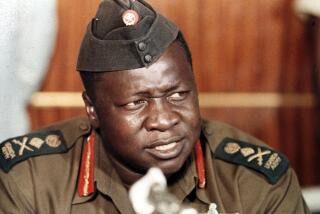Former Ugandan Dictator Who Ruled by Terror Dies
- Share via
Idi Amin, who ravaged Uganda as thoroughly as any leader in modern history ravaged any country, died today in a hospital in Jidda, Saudi Arabia, officials said. He was believed to be 78.
Amin, who almost single-handedly turned a nation’s prosperity into economic ruin and plunged a peaceful society into a nightmare of chaos and terror, was admitted to King Faisal Specialist Hospital on July 18. He had been in a coma and on life support since his admission.
Ruling by decree, Amin was one of the first postcolonial dictators in Africa to unleash mass killings as a response to internal opposition. During his eight years as president of Uganda, beginning in 1971, his government was held responsible for the deaths of as many as 500,000 of his countrymen. An additional 100,000 or more fled into exile, and thousands languished in prisons and underground torture chambers.
Before Amin, Uganda’s economy was considered one of the healthiest in East Africa. By the time he was overthrown, annual inflation was 200%, the national debt was $320 million, most plantations were overgrown, factories were closed, store shelves were bare.
“Those eight years were a nightmare,” the late Anglican Archbishop Silvanus Wani said some years ago. “You would leave your home in the morning on God’s work and not know if you would come home that night. Each evening was one of thanksgiving. The next day you went out in faith again.”
But Amin filled a strange need in sub-Saharan Africa. A former heavyweight boxer, he was a charismatic figure. He stood 6 feet, 4 inches, weighed 270 pounds and ruled with a combination of naivete and peasant cunning. More a tribal chief than a president, he was a master showman who loved center stage and knew how to use the international media.
To many Africans, he symbolized the revival of black nationalism, a sort of antihero who, no matter how misplaced his priorities or vicious his misdeeds, stood up to the whites and humiliated the Asians, always commanding attention if not respect. In Africa and other parts of the world -- such as the Caribbean -- he became a cult figure celebrated in song.
Many of his peers considered such behavior courageous and anticolonial. They quietly overlooked his atrocities.
In 1972, acting on what some later said was a fit of anger at being rebuffed by the daughter of a prominent Indian family, Amin expelled 50,000 people of Asian descent from Uganda. Mostly Indians and Pakistanis, they made up most of the class of merchants and shopkeepers that kept the economy running.
He took their businesses without compensation and gave them to his illiterate army friends. Many of the soldiers simply sold the merchandise and closed up the shops. The Ugandan economy has yet to recover.
Three years later, Amin forced four British businessmen in Kampala, the capital, to carry him on a homemade throne, then made a dozen others kneel before him, reciting an oath of loyalty. He sentenced British author Denis Hill to death for referring to him as a “village tyrant,” freeing him only after James Callaghan, then Britain’s foreign minister, flew to Uganda to plead for his life. Later Amin awarded himself the Victorian Cross and announced that he was adding to his list of titles -- which included Lord of All the Beasts of the Earth and Fishes of the Sea -- that of Conqueror of the British Empire.
Perhaps not surprisingly, it was Amin the buffoon, not Amin the butcher, who first caught the world’s attention. He raced around Kampala in a red sports car, watched “Tom and Jerry” cartoons at home, plunged into swimming pools in full military uniform during diplomatic functions, boasted that he had fathered 35 children and fired his beautiful foreign minister, Princess Elizabeth Bagaya, because, he claimed, she had made love to “an unknown European in a toilet” at Paris’ Orly Airport.
“In a medical sense, Amin wasn’t responsible for much of what he did,” Dr. Solomon Asea, a physician and former Ugandan ambassador to the United States, once said. “He should have been a patient, not a president. I think it is safe to say that medically he was crazy. He could kill a person one minute and the next he’d be laughing and playing the guitar with no apparent recollection of what he’d done.”
Amin is believed to have been born in 1925 to peasant parents who scratched a meager living from their two-acre plot north of Kampala. He was a Muslim and a member of the small Kakwa tribe. Shortly after his birth, his parents separated and Amin was raised by his mother, who lived with a succession of military men.
In 1946, with only a second-grade education, Amin joined Britain’s 4th King’s African Rifles as a cook. He fought in Kenya during the anticolonial Mau Mau rebellion, proving himself a tough and obedient soldier. But he was later criticized by British commanders in Uganda for overzealousness in suppressing a wave of cattle theft. By the time of independence from Britain in 1962, he had become the army chief for Uganda’s prime minister, Milton Obote.
Soon Obote began to lose control of Amin, who was reported to be selling arms to rebels in southern Sudan and engaging in other smuggling activity. When Obote flew to Singapore in January 1971 for a Commonwealth conference, Amin and his soldiers seized power. “I am not a politician but a professional soldier,” Amin said in his first address to the nation. “I am, therefore, a man of few words, and I have been brief throughout my professional career.”
Obote’s overthrow was greeted with rejoicing throughout Uganda. His repressive ways, his destruction of the Buganda monarchy and his flirtations with the Communist Bloc had made him increasingly unpopular at home and in the West. Besides, Amin gave every indication of being a sensible military man who would keep his promise to give way to a freely elected government in a few months.
Instead, Amin moved quickly to consolidate his power. The killing of opposition figures started within weeks. Then the guns were turned on the Acholi and Lango, the tribes that had formed the backbone of Obote’s support, then on the intelligentsia and the Christians -- then on almost everyone except his inner circle of Kakwa Muslims.
Bodies floated down the Nile and turned up by the hundreds in the Mabira and Namanve forests. Political prisoners in the Makindye, Naguru and Luzira prisons were forced to beat one another to death with sledgehammers. Entire villages were wiped out. Cabinet ministers, journalists, university professors, business executives and religious leaders “disappeared” by the dozen.
It was not until February 1977, when Uganda’s Anglican Archbishop Janani Luwum and two senior Cabinet ministers were slain in what was described as an auto accident, that world opinion turned against Amin. Several African nations broke their silence, and the Commonwealth and United Nations both debated the human-rights violations in Uganda.
The year before, in July, Israel had carried out a spectacular operation at Uganda’s Entebbe International Airport to rescue the passengers -- including nearly 100 Israelis -- of an Air France jet hijacked by pro-Palestinian guerrillas. The raid showed Amin’s vulnerability and deeply embarrassed him. Then the archbishop’s death earned him international scorn.
On Oct. 30, 1978, Amin made his final, fateful mistake. He sent his tribally divided army into Tanzania, hoping that a war would jack up the spirits of his debilitated nation and bring in fresh Arab aid. It was a miscalculation.
When the Organization of African Unity refused to condemn the unprovoked attack, Tanzanian President Julius Nyerere ordered his own ragtag People’s Militia into action. As Nyerere’s forces swept north toward Kampala, the Soviet-armed Ugandan army crumbled, virtually without a fight, and even the airlift of 2,600 Libyan troops to Uganda could not stem the tide. The Soviet Union withdrew its advisors, and the 44 nations of black Africa refused to offer any support.
Amin was alone. He flew into exile in Libya to join about 80 members of his family already there, and on April 14 the Tanzanian army, backed by a few hundred Ugandan rebels, marched unopposed into Kampala to a joyous welcome. A nightmare that had lasted eight years and three months was over, but only briefly.
Obote returned to the presidency in December 1980 with Tanzania’s support, but antigovernment guerrillas grew in strength and daring and, as in Amin’s day, the army responded with brutal abandon, slaughtering entire villages, burning, looting, raping. The death toll rose into the tens of thousands and official corruption became the accepted way of doing business.
“The whole country is run by unscrupulous, greedy thugs,” a Western businessman told The Times in Nairobi, Kenya. “There are things going on there now that never happened even in the worst days of Idi Amin.”
Under President Yoweri Museveni, who seized power in 1986, Uganda has slowly mounted an economic and political revival. Museveni has welcomed back Asians and others who were exiled by Amin. The president, who this year announced that he would support calls for multiparty politics, has been a favorite of international donors, who contribute a large chunk -- between 30% and 50% -- of his nation’s public expenditure.
On a trip to Uganda and other African nations in July, President Bush praised Museveni for campaigning to reduce the nation’s HIV/AIDS infection rate. Some studies find that fewer than 10% of Ugandans are now infected with the virus compared with 30% a decade ago. Amin’s relatives, many of whom still live in Uganda, urged Museveni to allow the ailing ex-dictator to return home to die. Aides to Museveni said that Amin could return from his more-than-two-decade exile in Saudi Arabia, but he would be liable for any outstanding legal issues.
Amin and members of his family have been sustained by the Saudi government, living in a modest villa on the outskirts of Jidda guarded by Saudi security agents. Amin was recognized from time to time as he moved about wearing traditional Arab robes, but he lived a largely private, low-profile existence.
Over the years, he spoke vaguely about returning to power if the Ugandan people wanted him. But Amin’s rule was a nightmarish chapter of the past that no one wanted to relive, so the onetime brutal strongman was to remain a hostage of the Arabian sands, far from the green hills of Africa.
In mid-July, New York-based Human Rights Watch lamented that Amin was never charged for his atrocities -- in the way that former Yugoslav President Slobodan Milosevic and former Liberian President Charles Taylor were indicted by war crimes tribunals.
“We regret that Idi Amin is dying without meeting justice for his crimes,” said Reed Brody, director of special prosecutions for Human Rights Watch. “Amin was one of the bloodiest tyrants in a bloody century. It’s increasingly possible to prosecute dictators outside their home countries. Unfortunately, the trend didn’t catch up with Mr. Amin in time.”
*
Lamb was The Times’ correspondent in Nairobi from 1976 to 1980 and is the author of the book “The Africans.”
More to Read
Sign up for Essential California
The most important California stories and recommendations in your inbox every morning.
You may occasionally receive promotional content from the Los Angeles Times.










